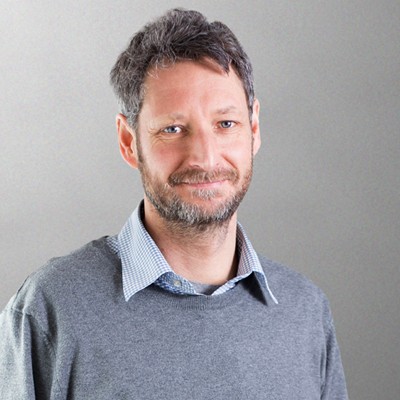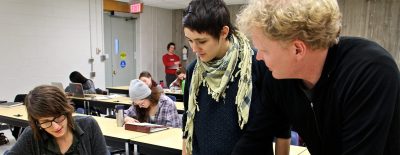by Amy Richardson, CFICE Communications RA
The Trent Community Research Centre in Peterborough, Ont. is just one of the many partners of the Community First: Impacts of Community Engagement (CFICE) project. Since 1996, the Centre has been matching Trent University students with research projects derived from questions in the community.

John Marris, Community Co-lead of the Community Environmental Sustainability (Peterborough/Haliburton) hub and the Community First Tools and Practices Working Group
John Marris, Director and Project Coordinator of Community-Based Research at the Trent Centre and community co-lead of CFICE’s Community Environmental Sustainability (Peterborough/Haliburton) hub community co-lead, defines the Centre as an independent research broker.
“We develop research projects with the community that answer research questions they have. We then match those research projects with the university in conjunction with faculty,” Marris says.
The Centre has three main areas of research: Community development, social support and environmental sustainability. But Marris says the projects can be anything the community approaches the centre with.
“We don’t in any way want to dictate to the community what the brains of our research are,” he says.
“We have a principle where we want to improve the health, sustainability and well-being of our community – that’s what’s really important to us and we want to do that through research work.”
Marris says the Centre focuses on those areas because of the impact to the community.
“We work in areas of social support and environmental sustainability because that’s what helps community development.”
Marris says providing evaluation of the projects is also important to the Centre.
“Impact assessment is a big part of what we do and this is very useful for local community organizations. The impact to the community is doing the groundwork for community development and helping with planning of projects,” he says.
“More and more I’m trying to connect us with projects as they happen so that we can build the evaluation into the design of the project.”
Unlike other programs, one of the unique things about the Trent Centre is that it works with third and forth year undergraduate students to facilitate partnerships, not just masters students.
Students become involved in a project by signing up for one of three courses that run in different departments at Trent University: Forensics, geography and international development. The Centre chose these departments because of the versatility of learning and application.
“One of the critical things that we do is we’re not creating academic exercises; these are real research questions that the community really wants answers to,” he says.

A group of people work together for a project.
©Elizabeth Thipphawong
Students can also go to the Trent Centre’s website to see a list of projects and approach the Centre themselves.
In the 2015/2016 academic year the Centre had 25 projects on the go, which Marris says is roughly the minimum.
Students really value the opportunity to apply what they’re learning in school to real life projects.
“We just had feedback from students for the academic year and fairly universally the response was ‘this is hands down the best thing I’ve done at university,’” Marris says.
As project coordinator, Marris offers students support, ideas and input throughout the project without grading their work, which is another aspect students really value. But the community also sees value in the partnership as well.
“There’s a huge need for knowledge from the community because sometimes they don’t have the financial wherewithal to pay commercial research organizations to do that work,” Marris says.
“The community gain is they get answers to questions that sometimes they’ve been sitting on for years.”
Marris calls the partnership between students wanting to do research and the community needing answers a “very happy and beautiful coincidence.”